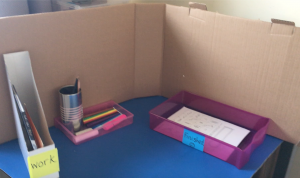Autistic Pupils and Homework
It is seriously one of the biggest issues we have to deal with when we support secondary autistic students, so I thought it would be worth sharing my suggestions about homework.
So…if you have a student refusing, never seeming to do homework, parents are saying that it is causing meltdowns and great distress, the student is always in detention for homework not being done, or their homework is of poor quality, here are some thoughts from Emma and I…
We don’t find it helpful to start with “Not doing homework is not an option” (this often comes from SLT) because that immediately clashes with the need to meet the child’s needs.
Homework is desirable and necessary as they work towards GCSEs as we know. So what should happen is a plan to work up to achieving homework success.
First you have to evaluate what the barriers are to homework for the pupil. They could be any or all of the following (or other things too)…
Rigid thinking pattern – “school is school / home is home” and not having the energy and thinking to accept that homework is the part of school you do at home.
Sensory stress – after keeping it together all day, they just have to let go of that stress at home and is in no fit state to do homework. (see https://www.reachoutasc.com/blog/spoon-theory-and-children-with-asc-in-school – this will explain it well)
Comprehension – does the student really understand what they have to do for homework? Have they copied it down correctly, has the teacher explained it in away they can understand?
Executive Functioning skills – has the student got the organisation, planning, self monitoring, predicting and working memory skills to be able to do homework independently? Auditory Processing difficulties are common in autistic pupils, they may only catch odd words in the verbal instructions and so never be able to write the homework down properly.
Fear of failure – schools are so quick to impose sanctions on autistic students who don’t do homework that you set them up for constant failure and there then is no desire to try as they fear the sanction and it becomes a self fulfilling prophecy. So many of my students start being given detentions as part of the schools rigid behaviour policy. This is not taking into account their SEND.
Here are some of the strategies we have tried successfully:
- Sit down with the student and the parent and discuss what the barriers might be. Then explain that homework is something important but you are going to make a stepped plan together to enable it to be successful.
- Remember homework must have a real purpose not be just a time filler so teacher has fulfilled their objectives (and can show senior management that they always set homework) The autistic students need to see the point of what they are doing (and other students too, I would suggest).
- Let all teachers know the plan – that their responsibility is to make sure the pupil understands and can achieve the homework. This may have to be differentiated at first. Structured activities or projects based on their interests work best, rather than open ended activities. Differentiate the sanctions – so if student can show they have tried, they don’t get detentions.
- Help the student learn organisation skills and along with parents discuss together how they are going to organise themselves at home. It may need a visual or written timetable, a sand or electronic timer and a reminder that after the agreed time it is ok to finish.

A simple workstation can be set up at home and be packed away once the homework is finished.
- Homework clubs are good if the student isn’t feeling overwhelmed – so have a clear purpose and build rewards into success – such as if homework is done with the help, parents will allow time on computer etc.
- Sometimes autistic pupils need a reduced timetable and the free periods are used to do homework for the rest of their subjects. This can go a long way to ease stress from too many subjects and homework.
- Social Stories (please use with care and get training if you want to write your own) can be helpful to record what you have agreed, explain it well and clearly and to leave with the student for them to remind themselves of the positive support and help they can get. Social stories are positive and affirming so help with self esteem too.
- I can do my homework Here is a social story that might help.
- Parents can set up a workstation at home (a desk or other quiet place in a hall or quiet room works well) and have clear start and end times, discourage internet use unless essential for the work and a favoured activity to do when they have finished.
- If writing is a problem let them do all their work typed on a computer but insist it has to be printed out and put into their book.
- Make homework successful, start easy, with what they CAN do and build it up.
- If there is sensory stress, allow sensory breaks and out these in place throughout the school day. Even very bright students can benefit greatly from these.
I have used and implemented all these strategies and schools have seen students build up to doing more homework, more successfully. However, I will say that occasionally homework just has to be suspended for the sake of the student managing and coping with the rest of the school day. This is often temporary but we have to remember that we are supporting a child with a SEND and that is their need. And to be truthful, we have had students get through their GCSEs never having done any work at home. Thanks to the flexibility of their school and support from teachers, they have been given the adaptations they have needed to get through.
This work is licensed under a Creative Commons Attribution-NoDerivatives 4.0 International License.






Should there also be [url=http://bestessay-services-reviews.com/]essay writing help service[/url] ? Because i dont see why there is stuff here that just isnt closely in link to that so thats why i am asking about that here !